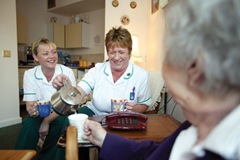Care beyond buildings
 The Health Service must end “almost an obsession” with buildings as most care can take place outside hospitals, the RCN’s Garrett Martin tells Peter Cheney. Health is everyone’s responsibility and all government departments must play their part.
The Health Service must end “almost an obsession” with buildings as most care can take place outside hospitals, the RCN’s Garrett Martin tells Peter Cheney. Health is everyone’s responsibility and all government departments must play their part.
Northern Ireland’s health system is far too focused on what happens in hospital buildings when community services can meet most needs, according to Garrett Martin. The Royal College of Nursing’s Deputy Director in Northern Ireland was speaking to agendaNi about the need to get the right care for the population as demand increases.
“We do need to get away from the almost obsession that the Health Service is based on the acute hospital,” he commented, objecting to the argument that “because we have had a hospital in a certain facility for so long means that it’s right.”
The number of acute hospitals is not the most important factor, in the RCN’s view: “We don’t believe it’s a matter of how many. It’s a matter of which services are available at the various facilities.” In Martin’s words, the central questions are: “What is being provided? Does that fit the needs of the population?”
All acute hospitals serve a “good purpose in terms of the service they provide” and demand is very busy at each one. Hospital beds can only be reduced if the right services are available in the community. If that were the case, a patient would have a “much shorter” stay if he or she needed to go into hospital.
People, of course, need treatment and care when they are sick but he points out that acute hospitals are also the most expensive form of care.
“I think our obsession, almost, with acute hospitals [has] led us to cases where patients are in hospital where an alternative, if available, would have been better for the patient as well as helping to save some valuable resources,” Martin explained.
“The demand is ever-increasing in recessionary times,” he remarked, pointing to the well-documented link between poverty and ill health. Merely protecting health spending would mean “a cut in real terms as the demand increases.”
A further culture change is needed to reduce that pressure. Preventing illness and promoting good health is everyone’s responsibility and must be seen in that way.
Every citizen has a responsibility to live a healthier lifestyle, which would cut down on obesity, diabetes and cardiac disease as a consequence. These are more difficult when personal budgets are tight but personal responsibility can ultimately affect the demand on services.
“Sometimes I do believe the Health Service has been a victim of its own success,” he said. “Albeit we have a right to health care, we all as individuals have to think about making healthier lifestyle choices.”
Every government department has a role to play, not just the DHSSPS.
“We all share a responsibility in terms of prevention and encouraging and promoting good health and well-being. That then can have a dramatic effect in terms of the medium and long term,” Martin added.
“We are fully conscious of the economic situation. We have to look at the next generation, the medium and long term, and if you don’t invest in things that will help promote good health and well-being, we are just creating and perpetuating a problem in terms of demand.”
How society cares for its most vulnerable members is a sensitive subject but one which has a rising importance. Northern Ireland’s population is ageing so an increasing number of older people will require care in future.
Martin wants to see “a service that is really focused on the needs of patients in the right place at the right time” The vast majority of care must take place outside a hospital. The alternative will see older people who need care facing real hardship.
“If we don’t get this right over the next five to 10 years, we could be in a generation where we just find it incredibly difficult to deal with the care needs of older people,” Martin stated. “We have to get this right as a society.”
From acute to local
The debate over how care is provided ties in with the wider shift from acute to local hospitals.
Northern Ireland has 11 acute hospitals (providing 24-7 emergency care and in- patient services etc.) and five local hospitals, which have fewer services. Seventy per cent of the hospital workload can be delivered in a local hospital, according to the DHSSPS.
This compares to 15 acute hospitals when the ‘Developing Better Services’ plan was announced in February 2003. The ultimate aim is nine acutes and seven locals. Five hospitals have made that transition, of which one (South Tyrone) lost its acute services before the 2003 announcement.
Changing a hospital’s status from acute to local therefore involves removing some services over a period of time, which usually results in local opposition.
It was decided that the Mater would become a local hospital “in due course” but should continue to provide acute services for a “considerable period ahead”, due to limited capacity in Belfast hospitals.
At present, Belfast has three acute hospitals, including the Royal and City in close proximity. A DHSSPS spokesman pointed out the Royal and City also provided regional services to the entire population of Northern Ireland (e.g. cancer treatment, major trauma, cardiac and neurology) as well as providing for their local populations.
Developing Better Services
Acute to stay acute
Altnagelvin (Derry) Antrim Belfast City Causeway (Coleraine) Craigavon
Daisy Hill (Newry) Royal Hospitals (Belfast) South West (Enniskillen) Ulster (Dundonald)
Local
Downe (Downpatrick) Mid Ulster (Magherafelt) South Tyrone (Dungannon) Tyrone County (Omagh) Whiteabbey
Acute to become local
Lagan Valley (Lisburn) Mater (North Belfast)





